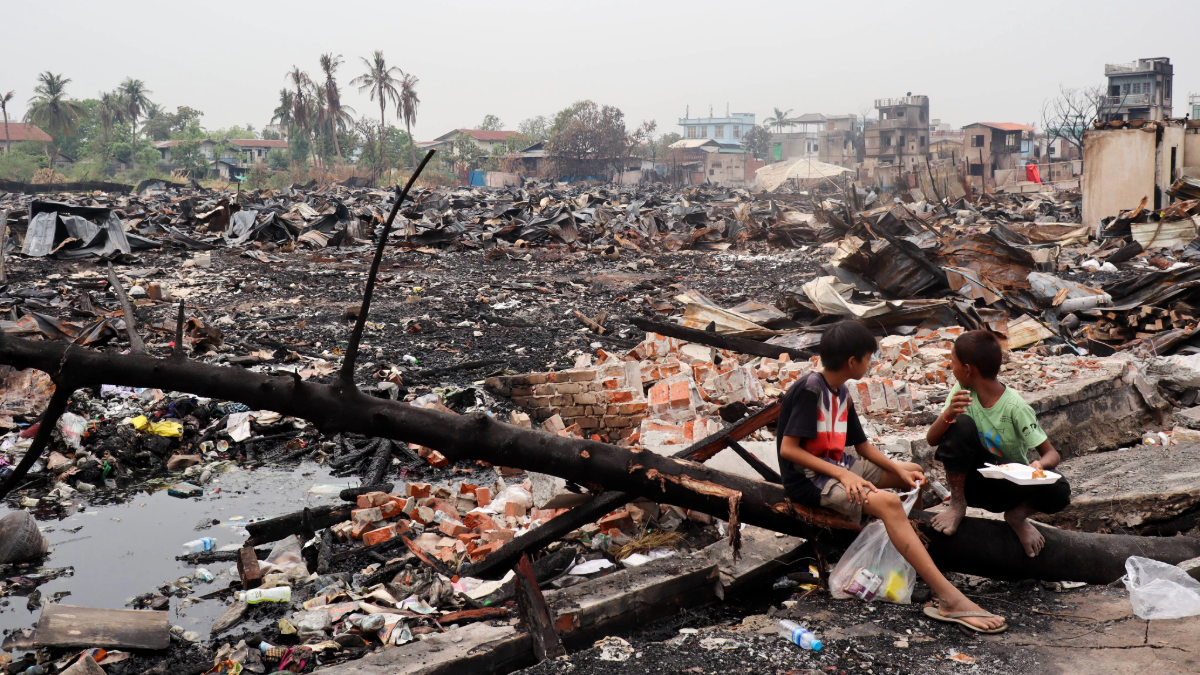Myanmar’s Digital Crackdown is Worsening: The World is Stepping Back
Wai Phyo Mint, Faiz Naeem / Jul 17, 2025Wai Phyo Myint is the Asia Pacific Policy Analyst, and Faiz Naeem is the Asia Pacific Program Associate at Access Now.

In the aftermath of one of the deadliest earthquakes in the country’s history, which struck in March 2025, Myanmar has entered an even darker chapter in its ongoing crisis. The fallout from such a devastating natural disaster has collided with a deepening authoritarian playbook, compounding the suffering of civilians already reeling from years of conflict and repression. Communications blackouts, surveillance systems, biometric ID schemes, and social media manipulation are becoming more entrenched than ever before.
This escalation is taking place against a backdrop of shifting global alliances and shrinking civic space. For years, countries such as Thailand and the United States have offered relative safety and support to exiled Myanmar activists, independent media, and civil society. However, that environment is rapidly changing. In Thailand, new SIM ID rules, financial restrictions, and targeted raids have disrupted cross-border operations and threatened the work of exiled communities.
Meanwhile, in the United States — once a reliable pillar of bipartisan support for Myanmar — recent policy shifts have introduced new uncertainty. Funding cuts have already affected key Myanmar-related programs. The Trump administration’s decision to impose tariffs on Myanmar, coupled with the inclusion of Myanmar in the latest US travel ban, signals a sharp departure from past practice. Previously, the US government had avoided direct contact with the junta, and both Democratic and Republican lawmakers actively supported the Burma Caucus. Today, asylum seekers from Myanmar face tightening immigration pathways, and the once-possible route to long-term protection through green cards is increasingly out of reach. These developments have left Myanmar’s diaspora in limbo and weakened the international support systems that once amplified their resistance.
Communications collapse
The March earthquake struck hardest in central Myanmar, with the Mandalay Region suffering severe damage. While physical devastation grabbed headlines, a parallel crisis was unfolding in the country’s digital landscape. According to a report by a non-profit organization, Athan, in the days before the earthquake, 107 townships were already under internet shutdowns, and that number jumped to 138 in early April. In Mandalay, mobile data services were inaccessible throughout April due to infrastructure damage, with limited and unreliable WiFi in some areas. Nearly two months later, internet connectivity has returned to parts of Mandalay, but across the country, five out of fourteen states and regions still have no access to the internet, while the rest suffer from unstable and fragmented connectivity.
The junta's breakdown of the communications infrastructure has forced the people in Myanmar further into isolation. Phone lines no longer work in many areas, and smartphones are becoming redundant without mobile or internet services. Worryingly, the crisis of connectivity is not limited to actions by the military. Armed resistance groups have begun to manage or interfere with alternative communication networks, including satellite-based systems. Last year, three such groups were reportedly disrupting Starlink and other satellite services. According to the monthly monitoring reports of the Myanmar Internet Project, today, the number of resistance armed groups disrupting Starlink and other alternative communication and satellite services has grown to at least five or six.
Attempts to maintain communication through satellite services like Starlink have also come under direct threat from the junta. Local sources report that rescue operations using Starlink devices have faced crackdowns, including confiscation of equipment and the threat of arrest. In at least one documented case, military forces conducted raids on a village where Starlink was in use. These actions have instilled fear among communities trying to keep even the faintest link to the outside world.
People living along the Thailand-Myanmar border face additional challenges. Since 2024, the Thai government has intensified its crackdown on the importation of Starlink terminals and other communication devices, citing efforts to combat online scam networks. However, this policy has severely impacted the Myanmar activist community, particularly those facilitating the transfer of secure communication tools to resistance groups inside Myanmar. Myanmar activists and civil society groups based in Thailand have faced targeted raids, arrests, and office shutdowns by Thai authorities for importing these communication devices.
e-ID: a tool for surveillance and coercion
The military has continued to expand its digital surveillance capabilities. At the core of this new regime is what civil society monitors refer to as the Personal Scrutinization and Monitoring System. This is believed to be a centralized military-run database that collects information on people’s location history, criminal records, financial activity, and more.
A key part of this system is the electronic identification card, or e-ID. The junta maintains that the e-ID is required only for specific purposes, such as applying for a passport or certain types of labor permits. But civil society groups have documented a steady increase in coercion. Workers are being pushed to enroll in the e-ID system or risk losing access to employment, social security benefits, and freedom of movement. Although there is no official mandate requiring all citizens to register, in practice, refusal to enroll increasingly leads to exclusion.
Once issued, the e-ID links the holder to a vast array of databases. With a single scan, authorities are reportedly able to pull up an individual’s personal history, including political affiliations, past arrests, and other sensitive details. The entire surveillance apparatus mirrors India’s Aadhaar biometric ID system. It was reported that members of Aadhaar's technical team provided expertise to the junta on biometric scanners — raising concerns about India's involvement in the military's surveillance infrastructure.
The proliferation of propaganda
The military has become increasingly aggressive in using social media to spread propaganda and disinformation. Civil society groups like Red Flag have reported a resurgence of coordinated military propaganda campaigns across social media. The junta has created perfect conditions for misinformation and false narratives to thrive. By implementing internet shutdowns, people cannot document and share real-time events from the ground. Independent journalists and media workers are often targeted for arbitrary detention, violence, and in some cases, killed for daring to report on human rights abuses. People who dare to speak out against the military face retaliation, including surveillance, arrest, or worse. Meanwhile, state-run media play a central role in shaping and amplifying the military’s disinformation, presenting official narratives that are then echoed across social media channels.
At the same time, major sources of independent news have gone silent. Recently, radio programs like Voice of America’s Burmese Program and Radio Free Asia, which once served as lifelines for remote communities, have ceased broadcasting due to international funding cuts. These closures directly weakened civil society’s ability to fact-check military disinformation and share verified information across media channels.
These developments are unfolding alongside a growing international acceptance of the junta’s presence on the world stage. In recent months, Senior General Min Aung Hlaing has attended high-level diplomatic events, including the BIMSTEC summit in Bangkok, Russia’s Victory Day in Moscow, and most recently the Eurasian Economic Forum in Belarus. He also met the Chinese president during his time in Moscow, marking their first face-to-face meeting since the coup. This increasing diplomatic recognition risks legitimizing the junta and undermining accountability efforts.
A global response: it’s now or never
Myanmar is facing a layered emergency: one of natural disaster, political violence, and systemic digital repression. The lines between these crises are blurring. Internet blackouts are not isolated incidents; they are long-term policies of silence. Surveillance infrastructure is not theoretical; it is being implemented on the ground. Propaganda is not incidental; it is part of a strategy to dominate the information space.
Myanmar’s people continue to resist with courage, under impossible conditions, but they need the international community operating together at the United Nations, as well as the more direct leadership of states such as the United States, whose funding cuts and recent policy changes under Trump have weakened international support systems for the resistance movement, humanitarian and civil society networks and flow of free and independent media. Countries like Canada, the United Kingdom, and members of the Freedom Online Coalition must also resist with them. Among their most urgent needs is the rest of the world’s coordinated support for secure and reliable internet access — a vital lifeline for communication, safety, and resistance. Alongside this, the protection of independent media, halting the export of surveillance technology, and rejection of diplomatic normalization with the junta must remain international priorities.
The story unfolding in Myanmar is not only a national tragedy — it is a warning of what happens when authoritarian regimes seize control of the digital sphere. It is also a call for global solidarity and urgent action — before it’s too late, and the struggle too weakened to fight back.
Authors

